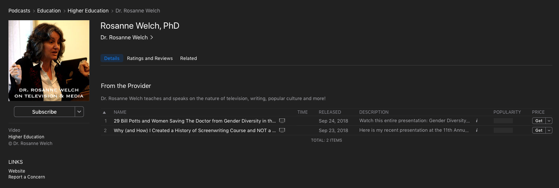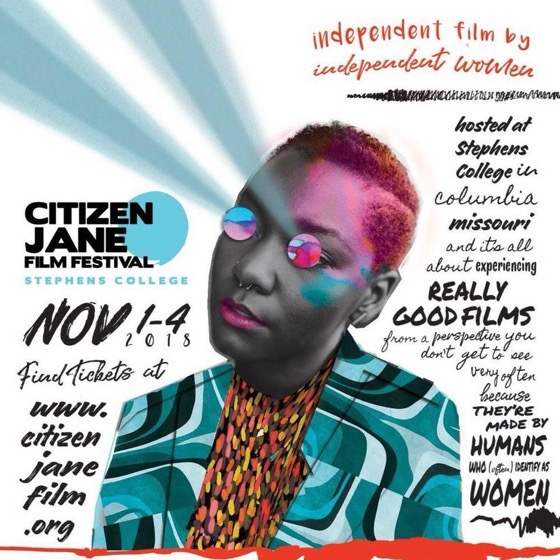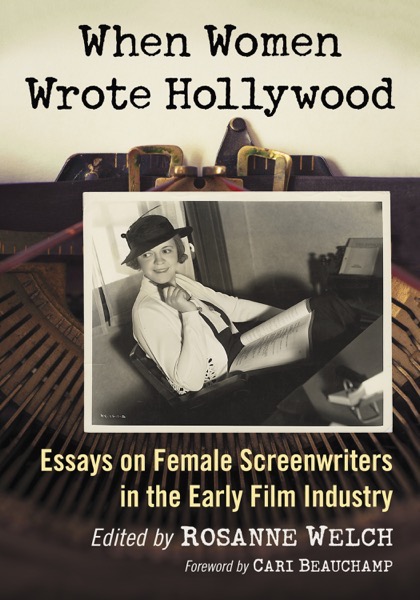Today’s Stephens College newsletter has a great piece about the Los Angeles launch party for When Women Wrote Hollywood with details about our upcoming launch at the Skylar Bookstore in Columbia, Missouri during the Citizen Jane Film Festival. — Rosanne



M.F.A. class publishes book of essays
Stephens College’s M.F.A. program now proudly boasts “When Women Wrote Hollywood,” a book of essays that focuses on the lives of female screenwriters of Golden Age Hollywood. The book, which published in July, is written by members of the inaugural graduating class of the Stephens M.F.A. in TV and Screenwriting. In the collection of 23 essays, Stephens Class of 2017 alumni write about female writers like Anita Loos, Adela Rogers St. Johns, and Gene Gauntier, whose work helped create unforgettable stories and characters beloved by audiences — but whose names are excluded from most film histories.“The mission of our M.F.A. program matched the mission of this book brilliantly — to increase the number of female screenwriters and female-centric stories told in Hollywood,” said Dr. Rosanne Welch, the book’s editor, and a Stephens assistant professor. She said her students used the essays as a way of thanking the earlier pioneering female writers who came before them.“When I introduce our Screenwriting History course, I remind students that we stand on the shoulders of those who came before us,” said Welch, a veteran television writer and scholar of screenwriting history. “Students are shocked at how many of these women were left out of most history books and are passionate about researching them for their final projects. When I read this first batch of essays, I knew they were worthy of publication.”The book is available on Amazon. It can also be purchased during Stephens’ Alumnae Leaders Weekend (Nov. 2-3) at the coinciding Citizen Jane Film Festival. In addition, a book launch event with local contributors will be held from 1-3 p.m. on Nov. 3 at Skylark Bookstore in downtown Columbia. Books can be purchased and signed by the authors.

![18 All About Intelligence from How The Monkees Changed Television [Video] (0:48)](https://rosannewelch.com/wp-content/uploads/2018/09/monkees-tv-18-intelligence.jpeg)



![29 Bill Potts and Women Saving The Doctor from Gender Diversity in the Who-niverse [Video] (0:42)](https://rosannewelch.com/wp-content/uploads/2018/09/gender-dw-29-bill-potts-women.jpeg)
![Why (and How) I Created a History of Screenwriting Course and NOT a History of Film Course with Rosanne Welch, Ph.D [Video] (17:15)](https://rosannewelch.com/wp-content/uploads/2018/09/srn-milan-1.png)

![17 More Intelligent Women from How The Monkees Changed Television [Video] (0:54)](https://rosannewelch.com/wp-content/uploads/2018/09/monkees-tv-17-intelligent-women.jpeg)
![28 Amy Pond from Gender Diversity in the Who-niverse with Rosanne Welch Ph.D [Video] (0:59)](https://rosannewelch.com/wp-content/uploads/2018/09/gender-dw-28-amy-pond.jpeg)
![16 Princess Rescuing The Princes from How The Monkees Changed Television [Video] (0:54)](https://rosannewelch.com/wp-content/uploads/2018/09/monkees-tv-16-princess-saves-princes.jpeg)
![Lauren Elizabeth Smith, Author of “Fearless and Fierce: June Mathis” from “When Women Wrote Hollywood” [Video] (4:02)](https://rosannewelch.com/wp-content/uploads/2018/09/w3h-smith.jpeg)
